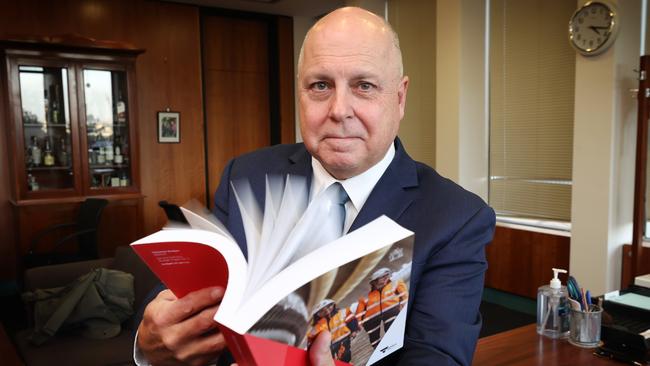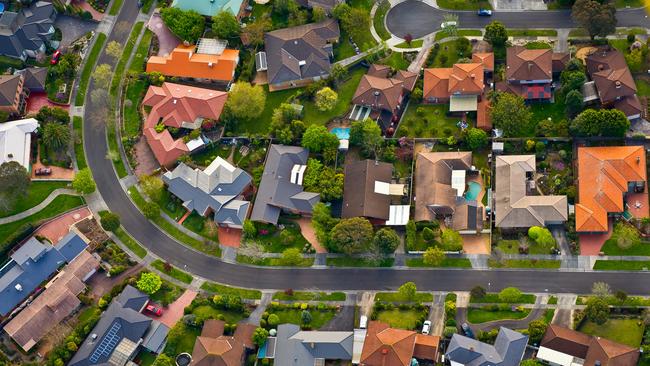Victorian budget: Daniel Andrews’ ‘decade of tax’ sentence
Victorian property owners and big businesses will be whacked with a decade of extra taxes, as net debt heads for $171bn.

Victorian Premier Daniel Andrews has punished property investors, private schools, big business and public sector workers in a big-taxing budget that fails to stop his state’s debt spiralling to $171.4bn by 2026.
Business groups and ratings agencies on Tuesday warned that Victorian Labor’s new decade-long tax regime – unveiled as part of measures to pay back $31.5bn of Covid debt – could result in an exodus of investment from Victoria.
Unions criticised public sector funding cuts and the end of the state’s native logging industry, community groups said they feared property taxes would be passed on to renters, and the opposition condemned the absence of any plan to pay back borrowings unrelated to the pandemic.
The Premier on Tuesday continued to blame Covid for his state’s financial woes, selling the budget as a one-in-100-year event that “tested all of us”.
“The government borrowed to save lives and save jobs,” Mr Andrews said. “That was essential. Now it’s essential that we pay that money back. That’s why the government has laid down a full and comprehensive Covid debt repayment platform.”
That platform includes a new decade-long business levy intended to raise $3.9bn over four years, a 10-year land tax expansion set to net $4.7bn over the same period, and $2.1bn of public service savings.
The business levy will operate similarly to the mental health levy the Andrews government introduced two years ago, meaning the same companies will get hit by both taxes.
Companies with a national payroll of more than $10m will pay 0.5 per cent of payroll, while those with payrolls above $100m will pay 1 per cent, with the taxes levied on the Victorian share of wages above the relevant threshold.
Having delivered a $13.8bn deficit in 2021-22, the government expects to be $10.3bn in the red at the end of the current financial year, falling to a $4bn deficit in 2023-24 and $1.1bn in 2024-25.
Private schools are also in the government’s sights to raise revenue, with 110 institutions to be stripped of their payroll tax exemption, raising $420m for the government over three years.
The government also used the budget to announce that it would bring forward its plans to close Victoria’s native timber logging industry from 2030 to next year, costing 560 jobs.
Business Council of Australia chief executive Jennifer Westacott said the budget made it clear the Andrews government was willing to charge companies more to do business in Victoria “at a time where we need to be accelerating investment in order to drive faster wages growth, protect jobs and grow the economy.”
“The private sector employs 3.2 million Victorians, almost nine in 10 workers,” Ms Westacott said. “These are the same employers who kept workers on their books during lockdowns, kept services running and paid their teams when they couldn’t work.
“Victoria is already the highest-taxing state in the country and the new Covid debt levy … means it will be even harder to invest in the state, let alone create new jobs or grow the economy. At some point, governments across Australia have got to come to terms with the fact with that companies have choices around where they invest and locate their operations, and increasingly, states like Victoria are making those investment choices very difficult. The only people who will suffer from that are the workers of Victoria.”
Victorians with investment properties, holiday houses and other industrial and commercial land will have their tax free threshold for general land tax rates reduced from $300,000, to see anyone with a second property worth more than $50,000 required to pay land tax.
Family homes will be exempt.
Those who pay land tax will be charged an extra $500 for landholdings between $50,000 and $100,000, with a $975 fixed change for landholdings above $100,000.
The tax rates will increase by 0.1 per cent for both general and trust taxpayers with holdings above $300,000 and $250,000 respectively.
The property measures are expected to raise $4.7bn over four years.
Mr Pallas said 860,000 taxpayers would be affected, paying an average of $1300/year extra over the decade.
This includes 380,000 land owners who do not currently pay the tax because they fall below the threshold.
A tax on big business will see the same companies which continue to be hit by the mental health levy the Andrews government announced two years ago hit with the same amount again — comprising 0.5 per cent for those with a national payroll above $10m, and an extra 0.5 per cent for those with payrolls above $100m.

The additional rates will be paid on the Victorian share of wages above the relevant threshold and are expected to raise $3.9bn over four years.
The government hopes to raise $2.1bn over four years through public service “savings and efficiencies”, including reductions in corporate and back-office functions and labour hire and consultancy expenditure.
Mr Pallas said the measures constituted the government “doing its bit, restoring the public service back towards pre-pandemic levels, while not affective frontline workers”.
But the budget papers show the public service wage bill continuing to spiral.
Having been forecast to hit $26.2bn during the current financial year in the 2019-20 budget, the bill is now set to reach $35.5bn this year, rising to $36.9bn, $37.5bn, $38.5bn and $39.8bn over the forward estimates.
The $38.5bn in 2025-26 compares with $35.4bn forecast just a year ago in the 2022-23 budget.
Mr Pallas pointed to a stabilisation of net debt to gross state product over the forward estimates, rising from 20.6 per cent during the current financial year to 22.6, 23.9, 24.4 and 24.5 per cent over the following four years.
“What that tells us is that we are now concentrating on using the debt on the balance sheet for economic growth and to enhance opportunity and getting rid of that debt that we have used for existential and welfare purposes,” the Treasurer said.
That stabilisation is based on an optimistic economic forecast, which sees real gross state product rise from a predicted 1.5 per cent in 2023-24 to 2.75 per cent in the out years.
Employment growth is expected to fall from 3.5 per cent this year to 0.75 per cent in 2023-24, improving to 1.75 per cent in the out years, with unemployment — currently at a historic low of 3.75 per cent — expected to grow to 4.75 per cent over the forward estimates.
Amid rampant inflation, the consumer price index for 2022-23 is expected to come in at 7.0 per cent, falling to 4.25 per cent next year, 2.75 per cent in 2024-25, and 2.5 per cent in the out years.
Net debt is set to hit $116.7bn this financial year — $500m worse than forecast in November’s pre-election budget update.
It rises to $135.4bn in 2023-24, and $151.2bn, $162.2bn and $171.4bn over the following years — up from the peak of $165.9bn forecast in last year’s budget.
That saddles Victorians with an interest bill which rises from $5.2bn in 2023-24, to $8bn in 2026-27.
The increasing debt offsets a slightly improved cash balance, with the government now intending to deliver a $1bn surplus in 2025-26 — $100m higher than forecast in November — rising to $1.2bn in 2026-27.
Having delivered a $13.8bn deficit in 2021-22, the government expects to be $10.3bn in the red at the end of the current financial year, falling to a $4.0bn deficit in 2023-24 and $1.1bn in 2024-25.
Private schools are also in the government’s sights to raise revenue, with 110 set to be stripped of their payroll tax exemption, raising $420m for the government over three years.
A raid on the Transport Accident Commission is expected to net $525m in 2023-24, at a time when Victoria’s road toll is at a five year high.
Speed camera revenue is set to increase from $470m in 2022-23 to $639m next year, falling back to $600m by 2026-27.
The government also used the budget to announce that it will bring forward its plans to close Victoria’s native timber logging industry from 2030 to next year, costing 560 jobs.
There is no mention of how Labor intends to fund the 2026 Commonwealth Games beyond the $2.6bn pledged in last year’s budget — with Premier Daniel Andrews earlier this month declaring he would not let the Albanese government “off the hook” after the federal budget contained no funding for the event.
The government’s signature election promise to bring back Victoria’s State Electricity Commission has been allocated $20.5m in 2022-23 and $24m in 2023-24, with no funding set aside thereafter.
Victoria’s $171.4bn debt in 2026-27 compares with a NSW projection of $116.5bn by 2025-26.
Opposition Leader John Pesutto said the budget showed that under Labor “Victoria is broke, life is getting harder and Victorians are being punished for the government’s incompetence.”








To join the conversation, please log in. Don't have an account? Register
Join the conversation, you are commenting as Logout